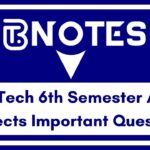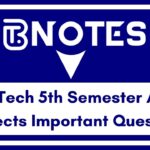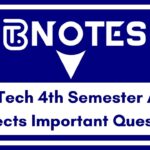The Bachelor of Technology (B.Tech) is a four-year undergraduate program that evolves from foundational learning in the early semesters to specialized, practical knowledge in later stages. For Computer Science and Engineering (CSE) students, the 5th semester marks a significant shift toward advanced core subjects and the introduction of elective courses, allowing customization based on interest areas like artificial intelligence or networking.
This syllabus outlines a typical 5th semester curriculum for CSE, focusing on software development, networking, and theoretical underpinnings essential for modern computing. While specific offerings may vary by institution, this structure prepares students for industry challenges and research opportunities in their final years.
B Tech 5th Semester Syllabus
Duration: Approximately 5-6 months (including classes, labs, and exams).
Focus: Advanced CSE concepts, networking, and elective specialization.
Theory Subjects
1. Software Engineering
- Topics:
- Software Development Life Cycle (SDLC): Waterfall, Agile, Spiral Models.
- Requirements Analysis: SRS, Use Cases.
- Design: UML Diagrams (Class, Sequence), Architectural Patterns.
- Testing: Unit, Integration, System Testing, Quality Assurance.
- Objective: Teaches systematic approaches to software design and development.
2. Computer Networks
- Topics:
- Network Models: OSI, TCP/IP.
- Data Link Layer: Framing, Error Detection, MAC Protocols.
- Network Layer: IP Addressing, Routing Algorithms (RIP, OSPF).
- Transport Layer: TCP, UDP, Congestion Control.
- Objective: Covers principles of data communication and networking.
3. Theory of Computation
- Topics:
- Finite Automata: DFA, NFA, Regular Expressions.
- Context-Free Grammars: Pushdown Automata, Parsing.
- Turing Machines: Computability, Decidability.
- Complexity Classes: P, NP, NP-Complete.
- Objective: Explores the theoretical foundations of computation.
4. System Programming
- Topics:
- Assemblers: Design, Two-Pass Assembler.
- Loaders and Linkers: Relocation, Linking Concepts.
- Macro Processors: Definition, Expansion.
- Compilers: Lexical Analysis, Syntax Analysis Basics.
- Objective: Introduces low-level system software development.
5. Elective – I (e.g., Artificial Intelligence)
- Topics:
- AI Basics: Search Techniques (BFS, DFS, A*).
- Knowledge Representation: Logic, Semantic Networks.
- Machine Learning Introduction: Supervised vs. Unsupervised Learning.
- Applications: Expert Systems, Natural Language Processing.
- Objective: Offers specialization in an emerging CSE field (varies by choice).
Practical/Lab Subjects
| Lab | Experiments/Activities | Objective |
|---|---|---|
| Software Engineering Lab | Creating SRS and UML diagrams for projects.Implementing small software modules.Testing using tools like JUnit or Selenium. | Practical application of software development processes. |
| Computer Networks Lab | Simulation of protocols (e.g., TCP, UDP) using tools like NS2.Configuring IP addresses and routing.Packet analysis with Wireshark. | Hands-on experience with network configurations. |
| System Programming Lab | Writing assembler and macro programs.Simulating loader and linker operations.Basic compiler design exercises. | Reinforces system-level programming skills. |
| Mini Project | Developing a small application (e.g., chat system, calculator).Team-based coding and documentation.Presentation of project outcomes. | Encourages practical application of semester learnings. |
Assessment
- Theory: End-semester exams (typically 60-70% weightage) + Internal assessments (assignments, quizzes, midterms; 30-40% weightage).
- Practicals: Lab performance, viva voce, and lab records.
- Credits: Each subject usually carries 3-4 credits (theory) or 1-2 credits (labs), totaling around 20-24 credits for the semester.
Notes
- Variations: Elective options might include “Web Technologies,” “Cloud Computing,” or “Cybersecurity” instead of “Artificial Intelligence.”
- Branch-Specific: This is for CSE; other branches might include “Machine Design” (Mechanical) or “Power Systems” (Electrical).
Conclusion
The 5th semester of the B.Tech program in Computer Science and Engineering represents a critical juncture, blending advanced theoretical knowledge with practical application through labs and mini projects. Subjects like Software Engineering, Computer Networks, and Theory of Computation equip students with the skills to design robust systems and understand computational limits, while electives open doors to specialization. T
his semester bridges core concepts with industry-relevant expertise, preparing students for internships, major projects, and careers in technology. Mastering this phase ensures a strong foundation for tackling cutting-edge challenges in the final semesters.
More Resource:






